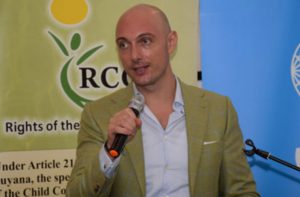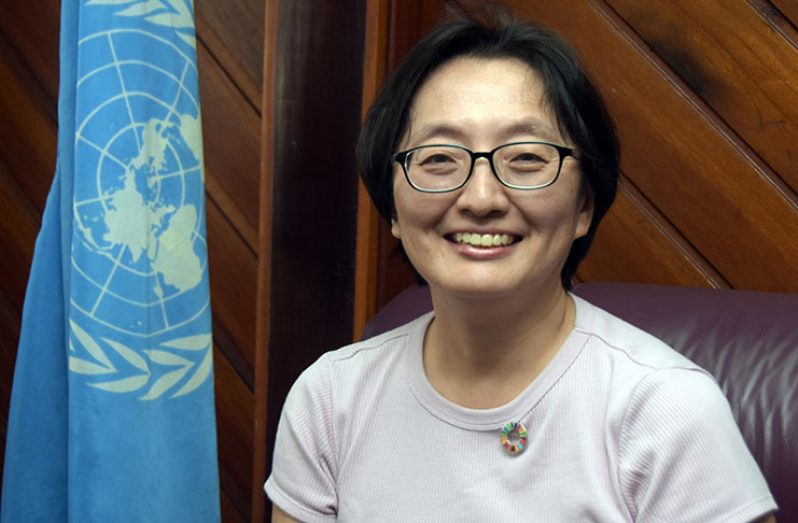TO aid in the fight against inequality in the field of science, there is need for the involvement of non-governmental individuals and groups; equal laws, policies and programmes; positive media depiction of women and more female role models.
This is according to United Nations (UN) Coordinator, Mikiko Tanaka and Deputy Representative of United Nation’s Children Fund (UNICEF), Paolo Marchi who spoke on Sunday’s observance of ‘International Day of Women and Girls in Science’. Tanaka said that the issue of women and girls in science tackles two Sustainable Development Goals (SDGs) of the UN, which are gender equality and Industry, Innovation and Infrastructure.
Based on available statistics only 30% of the workforce in research and development are women, Tanaka said, adding that while things are changing, it is important for women to have much more opportunities in the sciences than those that are available to them today.
“Traditionally, in many jobs…there have been more men than women and this is historical all around the world. But having said that, in the 20th century and going in to the 21st century, there has been, all around the world and in Guyana too, a lot of progress of women breaking in to jobs that maybe in their parents time were all [dominated by] men.
“It is happening. It’s not enough but women and girls should be bold, brave and confident to actually pursue that career.”
Providing solutions to some of the issues which hinder women and girls from pursuing careers in science, the UN Coordinator, first highlighted the need for affirmative and equal laws, policies and programmes to citizens of Guyana.
She said that while programmes, subsidies or incentives are funded by the government they must be designed in such a way that there are equal opportunities.
However, she then added: “I think it’s not enough just to be equal. Because of the current gap and the inequality that exists in many areas of women and girls opportunities, there needs to be a little bit more of affirmative action…If there are school competitions, unsure there is gender parity.”
This is not a job for the government alone as Tanaka says that politicians, teachers, community leaders, religious institutions all have a role to play in creating an environment where it is okay for girls to aspire for an education and career in science.
In addition, she pointed out that the media, through TV advertisements, posters and magazines are guilty of depicting women in degrading images and in conservative and traditional roles while men receive a positive spotlight.
To this she says: “Sometimes the way in which women are dressed to promote a product does not really value the woman’s intellectual capacity and the competence women bring. Change that. Depict women in that positive role of a professional, or a very competent, successful employee.” Finally, UN Representative said that the more role models women are exposed to the easier it becomes for them to learn how to succeed in science.

Similar views were shared by Deputy Representative UNICEF, Paolo Marchi, who also acknowledged the advancements of the world on the topic in the last five decades. “I think, globally, we have moved from a world in which women are not involved in science. In the last 50 years, globally, there have been more and more women who are Nobel winners in science, so I think that should be taken as an example of how women can be leading in the science area,” he said.
Even with this global progress, Marchi says that there is still the need for a change in the way men and women think about their roles in the work force. From a general standpoint, he explained that certain stereotypes and deterrents prevalent in Guyana and other countries continue to hinder women from working as they please and can further contribute to the acceptance of domestic violence.
“As UNICEF we believe it is very important to encourage women to work, to be active and to earn money because it defies the gender stereotype about who in the family is the bread winner.
“In families where there is potential violence or domestic abuse, it has been shown that if women are active, employed and earning a living, they are able to go away from a violent situation more easily than women who are economically dependent on their partner or spouses,” Marchi commented. The Deputy Representative added that over the years he has observed where the government has taken responsibility of encouraging women and girls to be a part of the science education as early as nursery school.
“In Guyana, the Ministry of Education has conducted several programmes in the past that are really trying to encourage girls to…defy and challenge the common knowledge and thinking that women are meant for certain jobs and other jobs are meant for men,” he said.
Continuing on the topic of science education, Marchi advised that teachers ought to play a role in ensuring that girls are not left behind in the classrooms, that their opinions are heard to ensure they develop a stronger voice when it comes to science. Marchi said that in some other countries, UNICEF has promoted programming courses for women and girls so that they too can learn how to become programmers and become assets to the job market.
When asked whether Guyana could be presented with similar opportunities, the UNICEF representative said that with the help of a team of partners and with a proposal which can be sustained, the venture would prove to be an interesting one which can help to push the country ahead.
Finally, leaving a few words of encouragement for girls and women in Guyana Marchi said: “There are many examples internationally where women are leading figures in the science world so I think if women from another country can do it, I’m 100% sure that Guyanese girls can do it even better.
“They have the capacity; they need to have the strength to fight to beat the gender stereotypes coming from others. They have the tools it’s just a question for them to wanting it and asking for it and then for the country to give them the platform to do it.”



.jpg)








